How can first-year STEM university students be better supported?
Going to university is a huge change from going to high school. At the University of Pittsburgh at Greensburg in the US, biologists Barbara Barnhart and Dr Olivia Long are using their Science Seminar programme to ease this transition for first year students studying biology, chemistry and biochemistry degrees.
Talk like a STEM educator
Autopsy — a surgical examination of someone’s body after they have died, with the aim of learning the precise cause of death
Cite — make reference to
Credibility — the quality of being trusted or believed
Holistic — considering and treating the whole of something, not just a part of it
Peer leader — for Science Seminar, an older student who acts as a mentor and role model for a younger student
STEM — subjects related to science, technology, engineering and mathematics
The first year of university can be overwhelming for anyone – from learning how to manage your workload to making new friends and cooking for yourself. At the University of Pittsburgh at Greensburg, Barbara Barnhart and Dr Olivia Long are providing students with vital skills to help them adjust to this new phase of education and develop a better sense of community with their peers. Called Science Seminar, their project aims to help STEM students transition to college life.
What is Science Seminar?
Science Seminar is designed to improve students’ academic, study and interpersonal skills. To decide which skills to focus on, Barbara and Olivia identified areas of weaknesses from their previous STEM students. “With this information, we created a variety of objectives, ranging from communication skills and respect for community, to leadership skills and critical thinking,” says Olivia. The programme also aims to inform students about what facilities and services are available to them on campus, as well as getting them to think about their personal and career goals.
How do the seminars work?
The Science Seminars are taught by full-time science faculty members who are familiar with the courses students are taking and will need to take in the future. The faculty member, along with a peer leader, provides mentorship and academic advice.
The seminars revolve around group projects, discussions and case studies on STEM-related issues. The goal is for students to consider scientific issues from multiple points of view and develop their critical thinking skills. “These activities give students opportunities to exchange ideas, learn from each other, communicate and develop teamwork skills,” explains Olivia. Ideally, the seminar will be a space where students feel comfortable sharing their ideas and asking questions.
What do the seminars teach students?
The course aims to teach a variety of skills, ranging from library and research skills (to ensure students can assess the credibility of what they read and dissect complex texts, such as scientific reports) to study-management skills (such as time and stress management and academic planning).
These skills are taught from a holistic and practical perspective, taking the wider student experience into account.
“For example, to teach time management, we ask students to break down a typical day and week, including class time, study sessions and personal time (for hobbies, meals, exercise, etc.),” explains Olivia. “This encourages them to be realistic about their time and establish a healthy work-life balance.” Students also identify distractions that limit their productivity – and ways to minimise these.
Library and research skills cover areas such as knowing how to reference and cite authors properly, being able to discern between reliable and unreliable sources of information, accessing scientific literature and giving accurate evidence-based arguments when writing scientific essays and reports.
“Students struggle with the overwhelming amount of information available online, so it is vital that they develop the skills in evaluating the credibility and reliability of the sources,” says Olivia.
Science Seminar objectives:
• Develop the academic skills necessary to make a successful transition to college life
• Identify and use campus facilities, resources and services that enhance academic and personal success
• Exhibit a sense of community among class members based on mutual respect, challenge and support
• Demonstrate computer literacy and effective oral and written communication skills
• Explore one’s own identity by reflecting on your own beliefs, values, attitudes and aspirations
• Demonstrate leadership and conflict resolution skills
• Demonstrate critical thinking and problem-solving skills
• Demonstrate awareness, respect and appreciation for differences among people
• Demonstrate the ability to work independently and collaboratively
• Establish personal and career goals
Reference
https://doi.org/10.33424/FUTURUM423
How are these skills taught?
The scope of objectives Olivia and Barbara are aiming for students to achieve demands a range of learning experiences. One of their methods is a focus on case studies, looking at specific issues in detail. One such case study revolves around the non-fiction book ‘The Immortal Life of Henriette Lacks’, written by Rebecca Skloot. The book describes the life of African American woman
Henrietta Lacks, who, during surgical procedures for cancer in 1951, had tissue samples removed from her body without her knowledge or consent.
Less than a year after being admitted to hospital, Henrietta died. During an autopsy on her body, more tissue samples were taken – this time, without her family’s knowledge or consent. Research conducted on Henrietta’s cells contributed to an astonishing number of medical breakthroughs, but this was all done without her permission and so raises ethical questions.
“The overarching question that the book proposes is ‘who owns your biological tissues?’,” explains Barbara. “By using case studies and books that highlight social scientific issues, we are teaching students that there are many factors and stakeholders that need to be considered when looking at STEM issues.”
What do students learn from studying this?
Studying and discussing such thought-provoking content teaches students that STEM issues are not straightforward; different perspectives and nuanced arguments must be considered. The impact of this learning can be seen when comparing student responses from before reading the book and participating in class discussions, to afterwards. Students who had changed their position were more likely to use evidence for that position when writing their final assignment, showing stronger research skills.
“On the other hand, those who did not change their position did not have appropriate evidence and gave their opinion without much support,” says Barbara. This shows that considering counterarguments is a vital part of learning and leads to an improvement in critical analysis and written communication skills.
How is Science Seminar forward focused?
Looking ahead to students’ futures, the programme also involves career exploration, prompting students to investigate graduate school, job requirements, and concepts such as job shadowing.
Olivia explains, “By encouraging students to consider their career options early on, they have a longer timeframe to make informed decisions, set meaningful goals, and take relevant action to shape their educational and professional paths.”
The focus on potential careers includes a visit from the on-campus Career Service Office. First-year students answer a career aptitude questionnaire to help them discover possible jobs that match their skills and interests. “It is common for students
to receive external influence, such as family expectations, when choosing their career paths, especially in science or medical fields,” says Olivia. “However, it is important for students to have a clear understanding of the requirements and expectations of their desired graduate programmes early on in their undergraduate careers. Without this knowledge, they may not be adequately prepared to meet the specific admission criteria.”
With this focus on preparation in mind, Barbara has created the ‘Five Graduate School Requirements’ assignment. Students choose five graduate schools and research their pre-requisite (essential) requirements, along with any other requirements, such as volunteer experience. “This serves as a helpful tool for identifying the requirements and accomplishments needed for admission to graduate school,” explains Barbara. “For example, some graduate programmes require applicants to have accumulated 500 or more hours of patient care contact hours. Attaining this level of experience solely during the final year of undergraduate studies would be quite difficult. The assignment helps students to see the importance of taking proactive steps as early as their first year of undergraduate studies.”
How successful is Science Seminar?
The programme’s success is reflected in the significantly higher first to second year retention rates for students in Science Seminar compared to students who do not take the class. “81.8% of Science Seminar students return as science majors as sophomores, compared to only 51.8% of non-Science Seminar students who are retained as science majors,” says Olivia
“The seminars make students feel valued as individuals, and their learning experiences become more meaningful and relevant to their interests and goals,” says Olivia. This results in students becoming more focused and engaged with their learning.
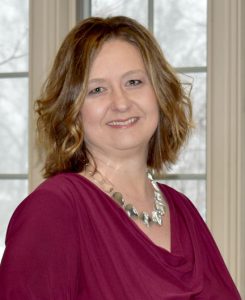 Barbara Barnhart
Barbara Barnhart
Instructor of Biology, University of Pittsburgh at Greensburg, USA
Field of research: STEM Education
Funder: US National Science Foundation (NSF)
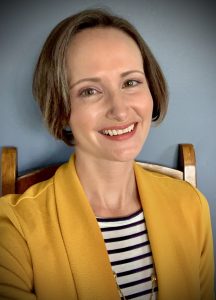 Dr Olivia Long
Dr Olivia Long
Associate Professor of Biochemistry and Biology, University of Pittsburgh at Greensburg, USA
Fields of research: Biology, Biochemistry, STEM Education
Funders: NSF, Eberly Foundation
Research project: Developing Science Seminars for first-year STEM college students
About biology
Biology is the study of all living things: their structures, processes, life cycles, habitats, and abilities to adapt and evolve. Biologists can study anything from how microscopic cells are created and work together, to how populations of animals evolve over time.
Studying all life on planet Earth makes for a very broad and wide-ranging subject area, and interdisciplinary research is critical in this field. Biology is often combined with engineering, medicine, psychology, sociology, chemistry, physics or mathematics, so that scientists can tackle complex, real-world problems.
“STEM issues are not ‘black and white’: there are many factors and stakeholders that need to be considered,” says Barbara. Studying biology involves looking at problems from different perspectives to come up with scientific and ethical solutions.
Why is interdisciplinary research important?
“Many scientific challenges, such as understanding the mechanisms of disease, addressing climate change, or developing sustainable technologies, require a multidimensional approach,” says Olivia. “By bringing together experts from various disciplines, interdisciplinary collaborations enable a comprehensive understanding of these complex problems and foster the development of holistic solutions.”
Pathway from school to biology
• To learn more about possible careers in biology, have a look at the ‘Biology: Changing the World’ project – also available as a phone app – which celebrates the work of different scientists in the field worldwide.
• Barbara suggests exploring the Best Colleges website. As well as useful information on what biologists can do and which areas they might work in, this website gives estimated salaries for different biology jobs according to years of experience.
• Olivia recommends having a look at the University of Pittsburgh at Greensburg ‘Career Ready’ page, which is “designed to assist high school students in exploring different career paths, developing professional skills, and making informed decisions about their future”.
• According to Career Explorer, the average salary for a biologist in the US is around $82,600 per year. “When it comes to pursuing a career in biology, students need to be realistic regarding salaries for biologists and the education required. There are many different fields of biology. Those who are pursuing a career with a bachelor’s degree will make less money than those with a doctorate degree,” Barbara adds.
Explore careers in biology
• At high school and post-16 years, choose biology, chemistry and physics classes. “If you have the option, take a statistics course and mathematics courses beyond algebra,” says Barbara.
• Choose a university course in biology or a subject related to biological sciences. “Biology is such an expansive field of study that the courses you choose really depend on what you wish to do as a career. You will have foundation courses including genetics, ecology and biochemistry. From that point, you will have a number of paths to consider such as molecular biology, microbiology or conservation ecology, for example,” says Barbara.
• Barbara recommends choosing a programme that can provide you with opportunities for independent research and internships. “Those are the experiences that will help you to decide which career in biology you wish to pursue,” she says.
• Get work experience in a laboratory. If you are interested in conservation biology or ecology, contact a local conservation charity and ask if they take volunteers.
• “Many careers in biology require education beyond a bachelor’s degree,” says Barbara. You are likely to need a master’s degree or PhD if you want to work in scientific research.
• The University of Pittsburgh at Greensburg runs a fully funded summer camp that gives students entering 9th grade an immersive opportunity to explore science, sustainability, mathematics and engineering fields. Students are selected through being recommended by their principal, teacher or guidance counsellor.
Meet Olivia
My high school biology teacher took the time to mentor me as a scientist, and I had an extraordinary college professor who also encouraged me.
Hands-on experience has been essential in my engagement with science. Working in the lab bridges the gap between theory and practice and has helped me understand how scientific principles are used in practical scenarios. This hands-on lab experience is where I gained a sense of accomplishment. While performing experiments, analysing data and drawing meaningful conclusions, I became more self-reliant, developed resilience when facing challenges, and helped build my scientific identity.
The worst advice I’ve been given is that as a female, I wasn’t ‘worth’ the time and effort to train as a scientist as I would eventually leave the field to have a family. The future of science lies in embracing diversity and ensuring equal opportunities for all. Women play a crucial role in shaping the scientific landscape, bringing unique insights and perspectives that drive meaningful advancements.
One of my proudest career achievements thus far is successfully completing my PhD. This significant milestone represents years of dedicated research, rigorous study and the mastery of specialised knowledge in my field.
Statistics in STEM suggest that I shouldn’t be where I am today. I am a first-generation, low-income, rural, female student who pursued degrees in STEM. This helps me to connect on an individual level with the students I am trying to engage and the struggles they may encounter. Personally, I have experienced the importance of an authentic connection and its impact on the success of a student. I am dedicated to understanding and enhancing the undergraduate educational experience for first-generation, rural, or underrepresented science students. I seek to improve access to resources, mentorship opportunities and hands-on experiences for these students.
Meet Barbara
I was inspired to become a scientist by a combination of courses, teachers and professors. My high school chemistry teacher encouraged me to complete an independent experiment that showed me that I was capable of being a woman in science. In college, I had two professors who also encouraged me to push myself to realise my true potential. I have also learned as much from interactions with students as they have from me.
I was a first-generation, financially needy, rural student. I had a family member who advised me to become a waitress or secretary because my divorced mother would not have the financial means for me to attend college. I began to look at those career paths, but, fortunately, my mother had a boss who gave much better advice. He believed that anyone could go to college and helped my mother and me to find scholarships and grants that brought that dream of college to reality.
My proudest career achievements are receiving the Outstanding Teaching Award at my college and the Chancellor’s Distinguished Teaching Award from my university.
In the future, I aim to continue to provide a supportive and inclusive teaching environment for students to learn and develop their STEM identities.
Barbara and Olivia’s top tips
1. Develop active reading habits like highlighting key points, taking notes, asking questions, and summarising and reflecting on the main ideas and arguments. This helps you retain information and promotes critical thinking.
2. Ask questions to challenge assumptions, clarify understanding and uncover hidden biases or gaps in reasoning. This helps develop a deeper understanding of the subject matter.
3. Participate in discussions and engage with others who may have different viewpoints. Be open to constructive criticism and actively listen to other perspectives. Regularly reflect on your own thinking processes and biases.
Do you have a question for Barbara or Olivia?
Write it in the comments box below and Barbara or Olivia will get back to you. (Remember, researchers are very busy people, so you may have to wait a few days.)

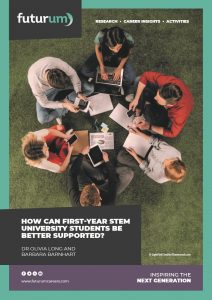
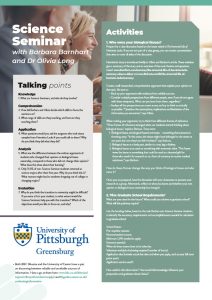
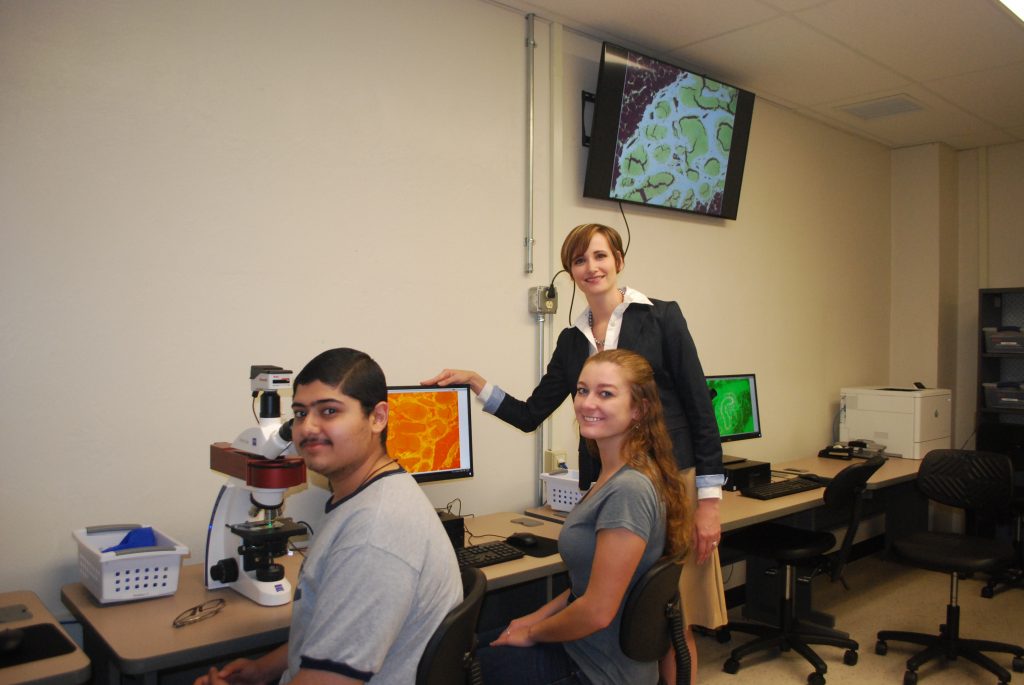
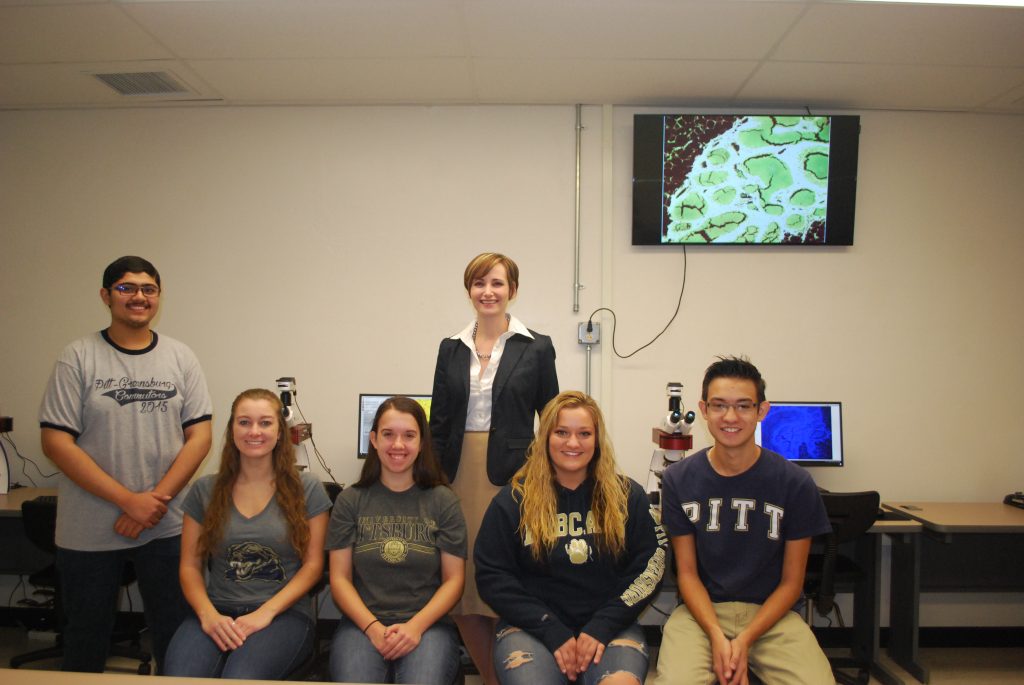



![RGB_Shield_Stacked_Greensburg_3color[1][1]](https://futurumcareers.com/wp-content/uploads/2023/09/RGB_Shield_Stacked_Greensburg_3color11-300x132.png)